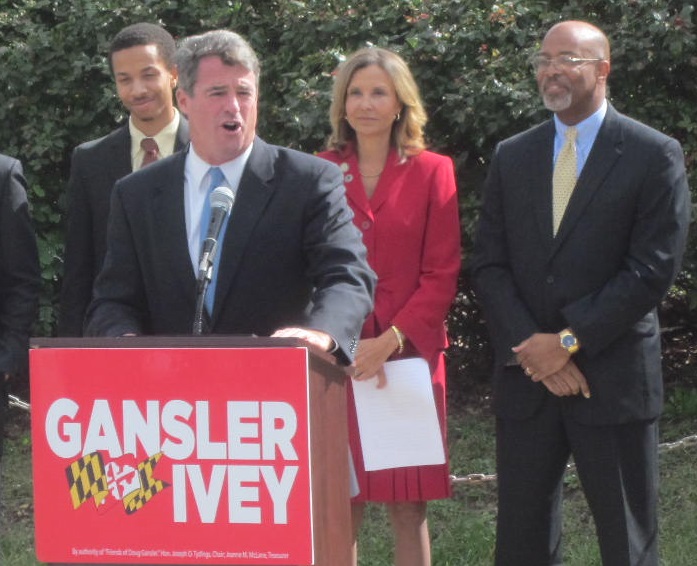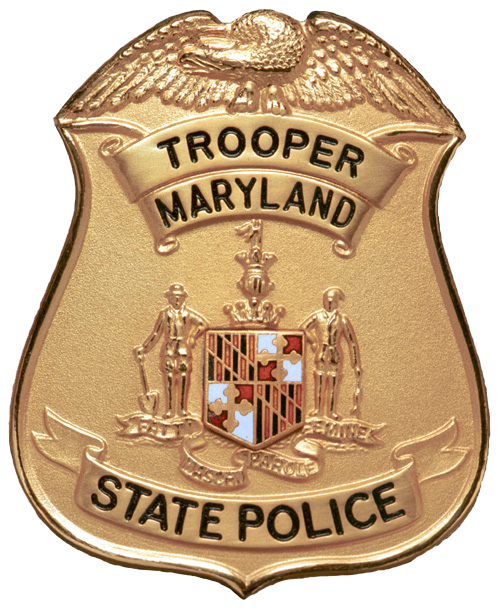Rascovar commentary: Gansler, Craig stumble in governor’s race
By Barry Rascovar
For MarylandReporter.com

Attorney General Doug Gansler announces Del. Jolene Ivey as running mate in race for governor. Husband Glenn Ivey, former state’s attorney for Prince George’s County is too the right.
Early stumbles in Maryland governor’s race are expected. Sometimes, though, those slips have lasting consequences. Already, Attorney General Doug Gansler and Harford County Executive David Craig have shot themselves in their political feet — wounds that might prove fatal.
Gansler’s trip-ups could be symptoms of a larger problem.
When the story broke that he’d been acting like an impatient cowboy in his state-owned car — sirens blaring, zooming through red lights and far exceeding the speed limit — he lashed out at the Maryland State Police and accused the governor of leaking news about critical State Police incident reports to help Lt. Gov. Anthony Brown’s gubernatorial campaign.
Gov. Martin O’Malley had kept this an internal matter for two years until John Wagner of the Washington Post made a public information request that documents how Gansler’s hyper-active personality extended to ordering troopers to ignore traffic and safety laws simply because he was in a hurry.
The reports — by at least seven different troopers — are highly unflattering.
Gansler needed to apologize, promise to end his back-seat driving commands and move on. Instead, he launched a PR effort to downplay and discredit the State Police documents. Bad move.
Then he blamed Brown and O’Malley for planting the story for political purposes. Second bad move.
Next, he partially apologized only to go on TV and blast “henchmen” in the State Police for trying to destroy him politically. Terrible move.
 Unprecedented response from police
Unprecedented response from police
It set off a volcanic reaction within the State Police and an unprecedented 500-word broadside denying Gansler’s assertions and strongly defending the troopers for doing their jobs. The statement vociferously rejected Gansler insinuations the Maryland State Police had entered the gubernatorial political fray.
Gansler repeatedly mishandled his responses.
He allowed the controversy to overshadow his selection of Del. Jolene Ivey of Prince George’s County as his running mate. Moreover, it left the strong impression he may not be ready for prime time as governor.
Doug Gansler is a fast-talking, quick-paced lawyer who got in trouble. and was reprimanded in 2003, by the state’s highest court for mouthing off inappropriately about court rulings he didn’t like while Montgomery County state’s attorney.
He’s an aggressive campaigner (and an aggressive lacrosse player, too) who appears equally aggressive on the highway — and in his public comments.
That may not be the sort of person voters want in the governor’s mansion.
Would he run political red lights as chief executive, trample on protocol and offend legislators to get his way?
Would he act impetuously on important issues instead of following the rules of the road in the State House?
O’Malley’s role questioned
Gansler may be right that O’Malley and his minions leaked word of the State Police reports — though it is more likely a veteran reporter like Wagner got word of Gansler’s misbehavior from an angry state trooper or a Brown ally with State Police connections.
More curious is the lengthy State Police statement condemning Gansler. The name of Marcus Brown, the State Police superintendent and an O’Malley appointee, appears nowhere on this document. The superintendent was conspicuously missing from this food fight.
It’s also next to impossible to release such a harsh and condemnatory statement without first gaining approval from the governor. The timing of the release — right before Gansler’s event introducing Ivey as his running mate — is equally suspect.
In public, O’Malley kept above the fray, simply praising the state troopers and the leader of the executive protection unit for providing quality security.
Gansler sees all this as more evidence of “dirty politics” and “dirty tricks” similar to an earlier episode where an audio suddenly surfaced showing Gansler dismissing Brown as a do-nothing lieutenant governor.
But without concrete evidence to support his claims, Gansler is left with egg on his face yet again.
He’s gotten into a pitched battle he can’t win. The longer he continues to deny and denounce, the longer and deeper the damage.
There’s plenty of time for his wounds to heal. But there’s also a chance these self-inflicted injuries could fester if Gansler isn’t careful.
In GOP race, Craig moves right
David Craig’s early mistakes could be equally serious.
He’s got a dual problem: Winning a Republican primary against far more conservative candidates in an era of successful Tea Party challenges in GOP primaries across the country, and then presenting a moderate face in the general election.
Swing hard right in June, march toward the center in November.
Craig is seeking to out-conservative his primary foes but he may already have created such a right-wing image that he’s killed his chances in the general election.
He’s been the favorite to win the primary. But the growing influence of Tea Party activists and ideological purists may have made him leery of being viewed as a soft-spoken moderate conservative.
So he has strayed farther and farther to the right in his statements, especially on the environment.
To date, Craig has called for eliminating state-mandated charges on impermeable surfaces (the so-called “rain tax”); repealing one of the key environmental statutes protecting the Chesapeake Bay, the Critical Areas Law; wiping out a law banning increases in stormwater runoff, and abolishing a law setting limits on farm fertilizer and waste runoffs.
He’s also called for tighter time limits on those receiving food stamps and other benefits. And late last week he said the state should defy the federal government and ignore Washington’s Common Core standards for raising education performance in public schools.
In one-on-one conversations, Craig sounds a lot more reasonable and moderate. He’s not abandoning the Chesapeake Bay, he says. He simply wants programs that are effective in cleaning up this vital estuary. He comes across as a pragmatist, which has defined much of his public career.
The trouble is that by issuing harsh right-wing statements on environmental, health and education issues, Craig cannot retract them after the June primary.
Environmentalists won’t forget
No Democratic or independent voter who cares about the environment is going to forget that Craig called for abolishing the pivotal Critical Areas Law. To them, that’s equivalent to trashing the Chesapeake Bay.
Democratic politicians will tar Craig for being an anti-environmentalist. He’ll be portrayed as an antiquarian seeking to erase a half-century of progressive legislation in Maryland.
None of what Craig proposes is realistic. A heavily Democratic legislature wouldn’t tolerate any of the notions he is advancing. He’s seriously harmed his electability.
The irony is that we still don’t know the strength of Tea Party politics in state GOP primaries. It could be loud but localized. If that’s the case, Craig is needlessly pandering to the absolutists while losing any chance of pulling off a November miracle.
Rascovar has been reporting and commenting on Maryland and national politics and government since 1971, first for the Baltimore Sun for decades, then the Gazette of Politics and Business and The Community Times. We are publishing his columns simultaneously with his own blog, PoliticalMaryland.com.

MarylandReporter.com is a daily news website produced by journalists committed to making state government as open, transparent, accountable and responsive as possible – in deed, not just in promise. We believe the people who pay for this government are entitled to have their money spent in an efficient and effective way, and that they are entitled to keep as much of their hard-earned dollars as they possibly can.

